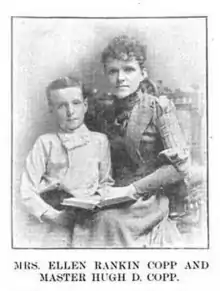

Hugh Doak Rankin, born Hugh Dearborn Copp (July 2, 1878— January 3, 1956) was an American artist who illustrated the science fiction magazine Weird Tales in the 1920s and 1930s.
Early life
Hugh Dearborn Copp was born in Loda, Illinois, the only surviving son of William H. Copp and Ellen Rankin Copp. His mother was a sculptor.[1] His great-grandparents Jean Lowry Rankin and John Rankin were noted abolitionists and hosts on the Underground Railroad in Ohio. When his parents separated, Ellen and Hugh went to live in Munich and study art.[2] On June 28, 1897, his father went to his wife's house in order to get her to sign a document confirming their reconciliation. He then attacked his wife's family with a razor and a revolver. Rankin's grandfather and mother were injured in the ensuring fight, but there were no fatalities. The police intervened and arrested Copp.[3] After this event, Hugh Copp distanced himself from his father's family and changed his name to Hugh Doak Rankin.[4] He served in the United States Army during World War I.[4]
Career
Hugh Copp got an early start as an exhibiting artist; as a teenager, his panel sculpture of "brownies" racing through hurdles was displayed in the children's room of the Women's Building at the World's Columbian Exposition in Chicago in 1893.[5] After the Exposition, he was granted $300 to continue his art studies.[6]
As an adult, Hugh Rankin started making illustrations for newspapers in Ohio and Chicago, before World War I. He was best known for his covers and interior illustrations for Weird Tales beginning in 1927.[7] Sometimes he signed his work "H. R." or using his middle name only, as "DOAK." He illustrated works by authors E. Hoffmann Price, Edmond Hamilton[8] and Robert E. Howard.[9]
It was primarily the nature of Rankin's artwork for Weird Tales covers which made young Robert Bloch's parents disapprove of the magazine, causing Bloch to cease reading it from 1928-1931, until he resumed reading it in 1932.
Rankin's style was called "strange, imaginative – if almost abstract — art-deco work" by a nostalgic fan many years later.[10] He also copyrighted a children's toy, the "Ziggity-zoo", which involved "drawings of animals with interchangeable heads."[11]
Personal life
He lived with his maternal grandmother Susanna Rankin, his mother's sister, Louisa, and her husband Paul E. Hermes, in Chicago after his mother's death, and later in adulthood in Los Angeles, California, where he was still living at the time of his death in 1956, aged 77 years.[4] As a World War I veteran, his remains were buried in the Fort Rosecrans National Cemetery in San Diego. His name was also added to his mother's tombstone in Logan County, Illinois.
References
- ↑ "Mrs. Ellen Rankin Copp" Archived 2016-10-13 at the Wayback Machine Illinois Women Artists Project.
- ↑ "Chicago Boy Abroad" Archived 2016-10-13 at the Wayback Machine Chicago Daily Tribune (December 16, 1894): 46. via Newspapers.com

- ↑ "To Slay a Family". Chicago Tribune. 1897-06-29. p. 1. Retrieved 2022-01-03 – via Newspapers.com.
- 1 2 3 Saunders, David (2017). "Hugh Rankin". www.pulpartists.com. Archived from the original on 2021-05-10. Retrieved 2022-01-03.
- ↑ "Genius of Mother and Son" Columbian Exposition Illustrated (April 1893): 40.
- ↑ Untitled item, Kindergarten Magazine 6(8)(April 1894): 662.
- ↑ "Summary Bibliography: Hugh Rankin" Archived 2016-10-13 at the Wayback Machine Internet Science Fiction Database.
- ↑ Richard W. Gombert, World Wrecker: An Annotated Bibliography of Edmond Hamilton (Wildside Press 2009). ISBN 9781434457264
- ↑ Everett Franklin Bleiler and Richard Bleiler, eds., Science-Fiction, The Early Years (Kent State University Press 1990): 335. ISBN 9780873384162
- ↑ Ray Russell, "Of Human Brundage" Archived 2016-03-04 at the Wayback Machine Playboy 38(2)(February 1991): 106-109.
- ↑ Catalog of Copyright Entries (1948): 20.